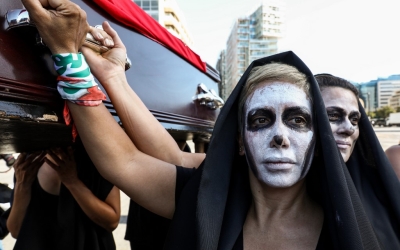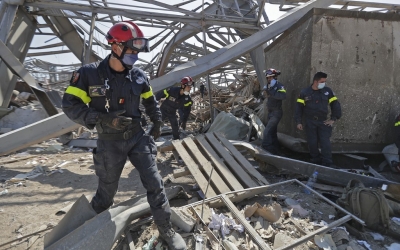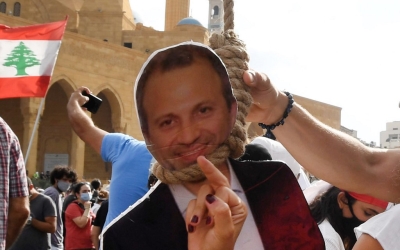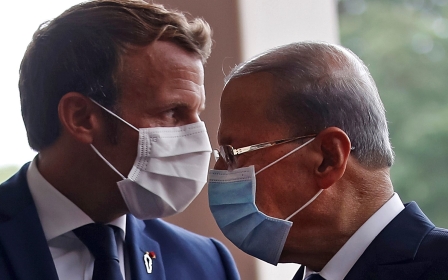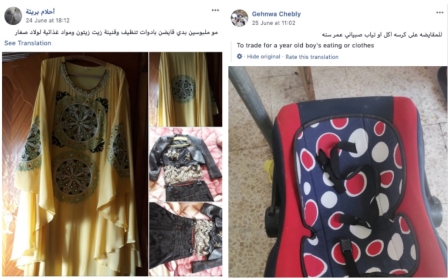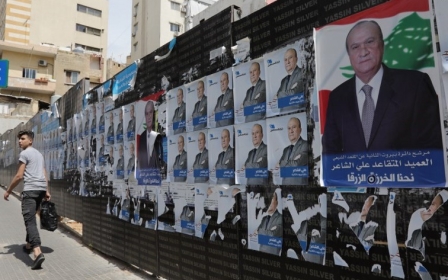Lebanon economic crisis: How a central bank audit turned into a quagmire
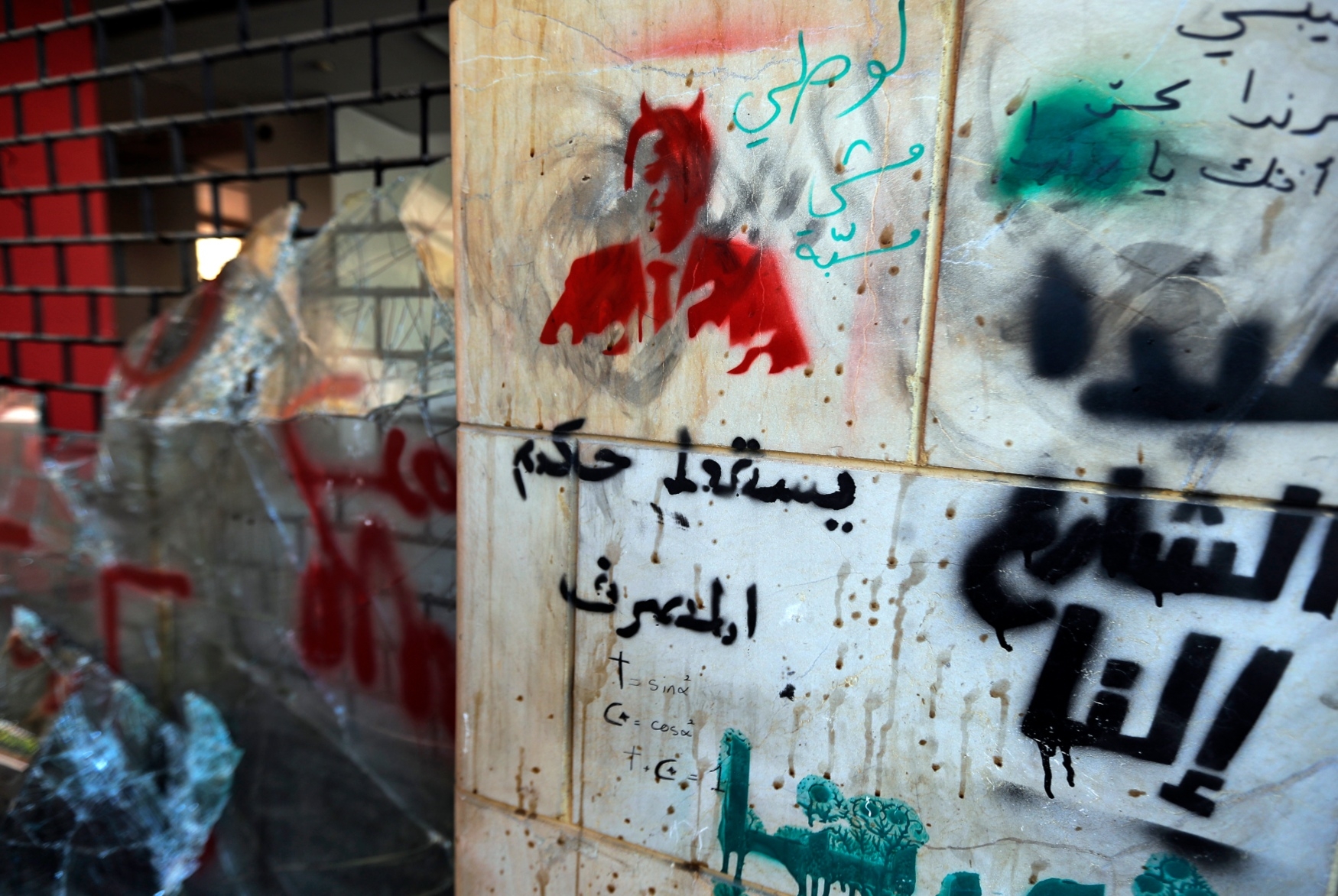
Lebanon has struck and failed twice in trying to audit its own central bank, as consulting firm Alvarez & Marsal confirmed on Thursday that it had withdrawn from its contract after months of deadlock.
Considered a crucial prerequisite to understanding and exposing the extent of the country’s notoriously rampant financial corruption and mismanagement, much of the Lebanese population and even the international community have pressed for a forensic audit to take place.
New MEE newsletter: Jerusalem Dispatch
Sign up to get the latest insights and analysis on Israel-Palestine, alongside Turkey Unpacked and other MEE newsletters
The International Monetary Fund has even deemed it a prerequisite for talks of an economic bailout to resume, while French President Emmanuel Macron says revealing the Central Bank’s financial and transactional data is a must to unlock a life-saving cash injection from the international community.
With over half the population living in poverty, the Lebanese currency losing roughly 80 percent of its value in the span of a year, and a stalled government formation process since mid-August following a devastating explosion in Beirut, Lebanon is in dire straits.
The international community has been calling for over 12 months on the Lebanese government to implement economic reforms and accountability mechanisms to make the economy viable again - to no avail.
“So, the BdL [Central Bank] forensic audit fizzled out again,” United Nations Special Coordinator for Lebanon Jan Kubis said in a tweet on Sunday. “Is anyone surprised?”
While a forensic audit has been in the works since March, it faced hurdles all along the way. It first fizzled out on 1 July with corporate risk consulting firm Kroll, after no contract was put into place since they were hired in April. Alvarez & Marsal were brought in soon after Kroll withdrew, but bowed out after they were stonewalled by the Central Bank.
Lebanon's parliament voted in favour of a forensic audit of its Central Bank and state institutions on Friday, without committing to a plan to make sure the next firm commissioned for the job does not face a similar impasse.
This latest setback only further highlights the political and legal hurdles facing Lebanon after a year of disaster after disaster - but it remains to be seen whether the country’s leaders are ready to step up and address the economic crisis, even at their own expense.
Obstructed by bank secrecy laws
Requests Alvarez & Marsal made to the Lebanese Central Bank on 9 September were leaked in late October, revealing what information sharing was rejected or approved.
The Central Bank only complied with sharing 43 percent of the requested information, primarily citing Lebanon’s banking secrecy laws as the reason for declining to share a host of significant transactional and financial data from the past five years.
Central Bank Governor Riad Salemeh told The Daily Star newspaper following the leak that he was simply complying with national laws, and that Parliament ought to amend its legal framework.
The laws, once used in the mid-20th century when Lebanon was a regional financial hub, have become an obstacle in economic recovery and accountability, he argued.
While some Lebanese officials, notably caretaker Justice Minister Marie-Claude Najm, have refuted Salameh’s claims that a forensic audit would violate Lebanon’s banking secrecy and financial laws, financial expert Mohammad Faour tells MEE that it’s complicated.
“You’re giving an analysis of how figures and balances have changed over time,” Faour said. “If there was really an issue with banking secrecy, BDL [Banque du Liban, the Central Bank] could have anonymised the accounts using a serial number, so the forensic auditor could track the accounts without knowing the identity.”
However, if suspicious data and transactions were found, identifying the culprits and the accounts of the people benefitting from it would require lifting banking secrecy, Faour explained.
“If you see suspicious accounts in terms of outflows outside of the country that need to be further investigated, then that’s where banking secrecy becomes an obstacle,” he said. “But having said that, much of the information BDL refused to give was not subject to banking secrecy.”
A government source told Middle East Eye that Alvarez & Marsal representatives allegedly ignored repeated calls from the finance ministry since their withdrawal.
Not even a meeting between Salameh, President Michel Aoun, Finance Minister Ghazi Wazni and the firm’s Dubai-based managing director, James Daniell, less than a week later could resolve the issue.
Though they initially agreed to give the Central Bank a three-month window to send the remaining documents, Alvarez & Marsal withdrew from the whole operation two weeks later, uncertain they would ever receive the necessary data and documents. And that was that.
Soon after the fallout, Aoun reiterated in a speech on Wednesday the need for a forensic audit, and demanded that Parliament address the matter, to which Speaker Nabih Berri complied.
While Parliament discussed the forensic audit on Friday, it remains unclear what proposals will be implemented to ensure a third attempt is successful.
A gateway to exposing decades of corruption?
That the future of a country hinge on a financial audit might seem strange to some - but advocates point out that it is a necessary first step towards broader accountability.
“Auditing any public administration is crucial,” Assaad Thebian of the Gherbal Initiative, a local nonprofit that advocates transparency, told MEE. “We need to know what is happening to taxpayers’ money [and] at the same time hold people accountable.”
'Whoever doesn’t want a forensic audit knows they’ve robbed the Lebanese people'
- Antoine Habchi, Lebanese Forces MP
Pressure groups and watchdogs aside, even Lebanon’s own ruling parties have publicly called for a forensic audit. Though agreeing with even their fiercest rivals on the surface, it appears that tensions between parties are intensifying behind closed doors.
MP Anis Nassar from the Lebanese Forces (LF), a key rival party of Aoun and his Free Patriotic Movement, told MEE that the audit is “no longer a luxury” given the state of the economy.
Having distanced themselves from other major parties over the past year, Nassar anticipated that previous attempts at an audit would be unsuccessful, saying that “nobody” in power wants it to actually happen.
“We support a full-fledged audit,” Nassar told MEE. “There are others who do not want it at all, and others who wanted it but only in their opponents’ ministries.”
Another LF parliamentarian, Antoine Habchi, told MEE that the party was lobbying with other parliamentary blocs for a proposal that would temporarily lift all banking secrecy laws for a year to get the forensic audit underway.
“We don’t think it’s necessary [to lift these laws] because the Central Bank should comply and give this information,” Habchi said. “Whoever doesn’t want a forensic audit knows they’ve robbed the Lebanese people.”
Aoun has accused “interest-driven roadblocks” of disrupting the audit, but who is behind it?
While Wazni, the caretaker finance minister close to Berri and his Amal party, stated in July that “political forces that I belong to are clear in their preference not to put in place any forensic audit”, both the Free Patriotic Movement and Lebanese Forces have accused Future Movement leader and Prime Minister-elect Saad Hariri of allegedly obstructing the process.
Several Future Movement MPs did not respond to calls from MEE on the matter.
Some local media outlets have reported that Berri referred the LF proposal as well as one from his own party to a parliamentary committee for further discussion. Amal party representatives could not be reached by publication time regarding the contents of their proposal.
Draft laws and legal proposals often linger in Parliament for years before they are passed - but this time, the cash-strapped country’s back is against the wall. Without a forensic audit and a host of other reforms and measures, Beirut won’t be able to get a hold of the financial aid it desperately needs.
A successful audit will demystify longstanding allegations of public money gone missing, nefarious profiteering, and rampant corruption.
But with the country’s ruling parties at the helm for decades, it remains to be seen whether they are willing to risk putting their own heads on the chopping block - and how much further the country could spiral downwards if they don’t.
Middle East Eye delivers independent and unrivalled coverage and analysis of the Middle East, North Africa and beyond. To learn more about republishing this content and the associated fees, please fill out this form. More about MEE can be found here.


